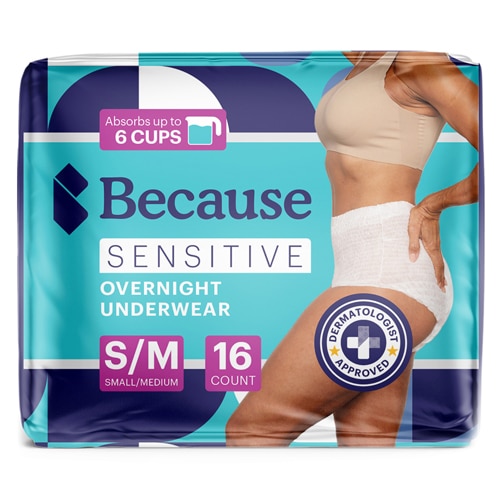[vc_row][vc_column][vc_column_text]Incontinence, often misunderstood and stigmatized, is a
common condition that affects an estimated 25 million Americans. It refers to the involuntary loss of bladder or bowel control, which can range from occasional leaks to more severe symptoms. Despite how common it is, many people feel embarrassed about their bladder leaks. In fact only 1
out of 12 people who experience bladder leaks seek help.

Types of incontinence
Incontinence isn't a one-size-fits-all condition; it comes in several forms, each with its own causes and characteristics. There are six main types of urinary incontinence. By identifying the specific type of incontinence, individuals can seek targeted treatments and strategies to better manage their symptoms.
Stress incontinence
Stress incontinence happens when you leak urine during physical activities, such as coughing, sneezing, laughing or exercise. Stress incontinence is sometimes referred to as cough incontinence or exercise-induced incontinence.
Urge incontinence
Urge incontinence, commonly referred to as overactive bladder or OAB, presents as a sudden and intense urge to urinate followed by involuntary leakage of urine.
Mixed incontinence
Mixed incontinence refers to incontinence that has symptoms of both stress and urge incontinence. This type of incontinence is common in women, particularly those who have had children and gone through menopause.
Functional incontinence
Functional incontinence is a type of incontinence that is caused not by an issue with the bladder or urinary tract, but instead by the person’s ability to reach the bathroom in time. Functional incontinence can be caused by mental health conditions, medications that alter the sense of reality, brain damage, or mobility issues that prevent them from reaching the bathroom in time.
Reflex incontinence
Patients with reflex incontinence experience bladder leaks with no warning or urge. Reflex incontinence is typically a result of brain or nerve damage which interrupts the body's ability to signal bladder fullness of emptiness. Common causes are severe brain damage, spinal cord injuries, MS, or radiation treatments.
Overflow incontinence
More common in men, overflow incontinence occurs when the bladder is unable to fully empty, resulting in bladder leaks later on. Overflow incontinence can also cause bedwetting, difficulty urinating, and your urine stream to stop and start.
What causes incontinence?
Incontinence can occur for a variety of reasons such as trauma to the pelvic floor, nerve disorders, obesity, hormonal changes and more. Here we will cover some of the most common causes of incontinence and why they occur.
Pregnancy & childbirth
Incontinence during
pregnancy and postpartum is a common issue, often linked to the physical and hormonal changes a woman's body undergoes during these stages. During pregnancy, the growing uterus puts increased pressure on the bladder, which can weaken the pelvic floor muscles that support the bladder and urethra. This pressure, combined with hormonal shifts that relax the muscles and ligaments, can lead to stress incontinence, where activities like coughing, sneezing, or laughing cause urine leakage.
Postpartum incontinence occurs as a result of the strain and stretching of the pelvic floor muscles during childbirth. Vaginal delivery, in particular, can lead to temporary or even long-term weakening of these muscles, making it harder to control bladder function. Additionally, any trauma to the nerves that control the bladder or damage to the pelvic support structures during delivery can contribute to incontinence.
Prostate cancer & surgery
The
prostate surrounds part of the urethra, the tube that carries urine from the bladder out of the body. During prostate cancer treatment or surgery, especially when the prostate is removed, the muscles and nerves that help control urination can be damaged or weakened.
Radiation therapy for prostate cancer can also lead to incontinence by causing inflammation or scarring in the bladder and urethra, which can reduce their elasticity and function.
Menopause
Menopause can cause incontinence due to the decline in estrogen levels, a hormone that helps maintain the strength and elasticity of the pelvic floor muscles and the tissues around the bladder and urethra. As estrogen levels drop, these tissues can weaken, leading to decreased support for the bladder and urethra, which increases the risk of stress incontinence. Additionally, the thinning of the urethral lining and changes in bladder function during menopause can make it more challenging to control urine flow, contributing to both stress and urge incontinence.
Nerve Damage
When the nerves that control the bladder are damaged or start to fail, the brain may not receive accurate information about when the bladder is full, or it may not effectively signal the muscles that control urine release. Conditions that affect the nerves and signals between the bladder and brain include: multiple sclerosis, Parkinson’s disease, spinal cord injuries, diabetes and stroke.
Treatments for incontinence
Treatments for incontinence range from simple lifestyle adjustments to surgical interventions depending on the severity of the patient’s condition. Typically, healthcare providers start patients off with lifestyle modifications such as avoiding bladder irritants, bladder training, timed voiding and
pelvic floor exercises. If those treatments don’t work, then patients may move on to other treatments such as medications, nerve stimulation therapies, botox injections or urethral bulking injections.
If the patient is still experiencing severe symptoms, surgery may be considered.
Tips for managing symptoms of incontinence
If you’re struggling with bladder leaks, there are a few lifestyle changes you can make today that could help reduce leaks and urgency.
Avoiding bladder irritants
Bladder irritants, such as caffeine, alcohol, spicy foods and acidic fruits, can exacerbate incontinence by irritating the bladder lining and increasing urinary frequency and urgency. These irritants can make the bladder more sensitive and prone to involuntary contractions, leading to episodes of urge incontinence. Reducing or eliminating these triggers from the diet can help manage symptoms and improve bladder control.
Staying hydrated
Staying hydrated is essential for overall health and can even help manage incontinence. While it may seem counterintuitive, drinking enough water prevents the bladder from becoming overly concentrated with urine, which can irritate the bladder lining and worsen incontinence symptoms. Proper hydration supports healthy kidney function and reduces the risk of urinary tract infections, which can also contribute to incontinence.
Practicing timed voiding
Timed voiding is a bladder training technique where individuals schedule regular bathroom visits at specific intervals, rather than waiting for the urge to urinate. This practice helps retrain the bladder to hold urine for longer periods and can reduce the frequency and urgency of incontinence episodes. Over time, timed voiding can improve bladder control and help individuals regain confidence in managing their symptoms.
Bladder protection products
Bladder protection products offer practical solutions for managing incontinence, helping individuals maintain comfort, dignity and an active lifestyle. Specialized
underwear and
pads provide discreet, absorbent protection against leaks, while guards are designed specifically for men to shield against small leaks and dribbles. Underpads offer an added layer of security, protecting bedding and furniture from accidents.
In addition to absorbent products, no-rinse sprays and
barrier creams help keep the skin clean, moisturized and protected from irritation caused by prolonged exposure to moisture, reducing the risk of skin breakdown and infections. These products collectively empower individuals to manage incontinence with confidence and ease.[/vc_column_text][/vc_column][/vc_row][vc_row][vc_column][vc_text_separator title="Featured Products" border_width="2"][vc_row_inner equal_height="yes" content_placement="middle" gap="35"][vc_column_inner width="1/3"][vc_single_image image="178222" img_size="full" alignment="center" onclick="custom_link" img_link_target="_blank" css=".vc_custom_1727124235247{padding-right: 7% !important;padding-left: 7% !important;}" link="https://www.vitacost.com/because-booster-pads"][/vc_column_inner][vc_column_inner width="1/3"][vc_single_image image="178220" img_size="full" alignment="center" onclick="custom_link" img_link_target="_blank" css=".vc_custom_1727124258686{padding-right: 7% !important;padding-left: 7% !important;}" link="https://www.vitacost.com/because-overnight-bladder-control-underwear-16-pairs-small-medium"][/vc_column_inner][vc_column_inner width="1/3"][vc_single_image image="178221" img_size="full" alignment="center" onclick="custom_link" img_link_target="_blank" css=".vc_custom_1727124275757{padding-right: 7% !important;padding-left: 7% !important;}" link="https://www.vitacost.com/because-extra-large-cleansing-wipes"][/vc_column_inner][/vc_row_inner][/vc_column][/vc_row]




